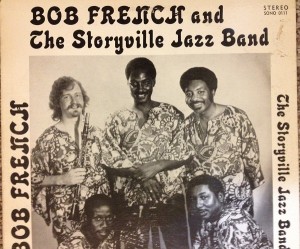UPDATED: A viewing and service will be held on Saturday, November 17, from 1 to 3 p.m. at Rhodes Funeral Home, 3933 Washington Ave. in New Orleans.
Drummer Bob French was such a forceful personality that his reputation as a controversial WWOZ disc jockey actually overshadows his most important accomplishment, leading the Original Tuxedo Jazz Band. From 1977 to 2011 French served as the band’s fourth leader. Formed by cornetist Oscar “Papa” Celestin in 1910, the band boasts the longest history of continuous performance in New Orleans jazz. After Celestin passed in 1954, trombonist Eddie Pierson led the band until his death in 1958. Bob French’s dad, banjo player Albert “Papa” French, then took over the group. Bob took the helm after his father died in 1977. When ill health forced Bob to step down in 2011, his nephew Gerald French became the new leader.
Monday night, November 12, Gerald French celebrated his uncle’s legacy only hours after his death by performing the Original Tuxedo Jazz Band’s regular Monday night gig at Irvin Mayfield’s Jazz Playhouse. “It was a night of mixed emotions,” said Gerald. “But it was a joyous time, really, remembering him, a lot of people showed up. There were a lot of stories told about my uncle, a lot of anecdotes about the band, and we played our hearts out for him.”
At one point the Original Tuxedo Jazz Band brought tears to the audience’s eyes with performances of “I’ll Fly Away” and “Didn’t He Ramble.”
“It was a little like a jazz funeral,” said Gerald, “but it was more about Bob’s life because of the character and the personality that he was.”
That personality made French one of the most colorful and controversial disc jockeys in town. When you listened to Bob French on his late-morning New Orleans Music show on WWOZ you always knew what you were going to hear, but you could never predict what he might say. It seemed like he played the same dozen records over and over and over and over. Good stuff—Kermit, Danny Barker, and you just might hear the majesty of Earl King’s “Trick Bag” and be reminded that it was none other than Bob himself on drums. He epitomized the sentiment of the timeless New Orleans funeral tribute “Didn’t He Ramble,” even though the song wasn’t written about a radio DJ. And I always got a kick about that 11 a.m. call to anyone listening to bring him up a bottle of brandy. Things could get strange, like on the morning of his contemporary Snooks Eaglin’s memorial when he went on and on about how disgraceful it was to hold what turned out to be a very moving ceremony in the Howlin’ Wolf nightclub instead of a church. And for several years after Katrina, French devoted a solid chunk of his airtime to excoriating anyone who hadn’t yet returned to New Orleans. OZ management loved French because the man pulled in money during fundraisers with his no-holds-barred style.
But French also had his irascible side, and when he got into a fight with another DJ WWOZ reluctantly let go of one of its most colorful personalities. “He pulled no punches,” said Davis Rogan, another former OZ DJ who was dismissed by the station. “In a world of fakeness he was shockingly, hardcore honest.”
History is likely to remember French more for his music than his shock jock antics.
“I think his legacy is that he adopted the policy of teaching the younger musicians to play traditional New Orleans jazz,” said Gerald. “When I was coming up, the older musicians helped us out but that kind of stopped happening. If it wasn’t for Bob you might not have Glen Andrews or Shamarr Allen or Kid Chocolate playing traditional jazz, they’re a generation behind me, they’re in their thirties and all of these guys have been in the Tuxedo band under Bob. They’re all great musicians and they’re all from New Orleans but where they went to school, NOCCA or elsewhere, the emphasis is on modern jazz, not New Orleans jazz. When they got in the band with Bob, he’d say. ‘Okay, you can play your horn, that’s great, but you need to play this, you need to learn the traditional music of New Orleans. We need to preserve the culture.’ That’s something he instilled in a lot of young musicians and I think that’s going to be Bob’s biggest legacy.”
French made numerous recordings but the one that stands out under his own name is the 2007 release Marsalis Music Honors Bob French. Released on Branford Marsalis’ own label, the album featured guest appearances from Marsalis, Harry Connick Jr. and Trombone Shorty, among other New Orleans stalwarts. French led the cast through a series of traditional New Orleans jazz standards including “Basin Street Blues,” “Milenberg Joys,” “Burgundy Street Blues,” “When It’s Sleepy Time Down South” and “Saints.”





